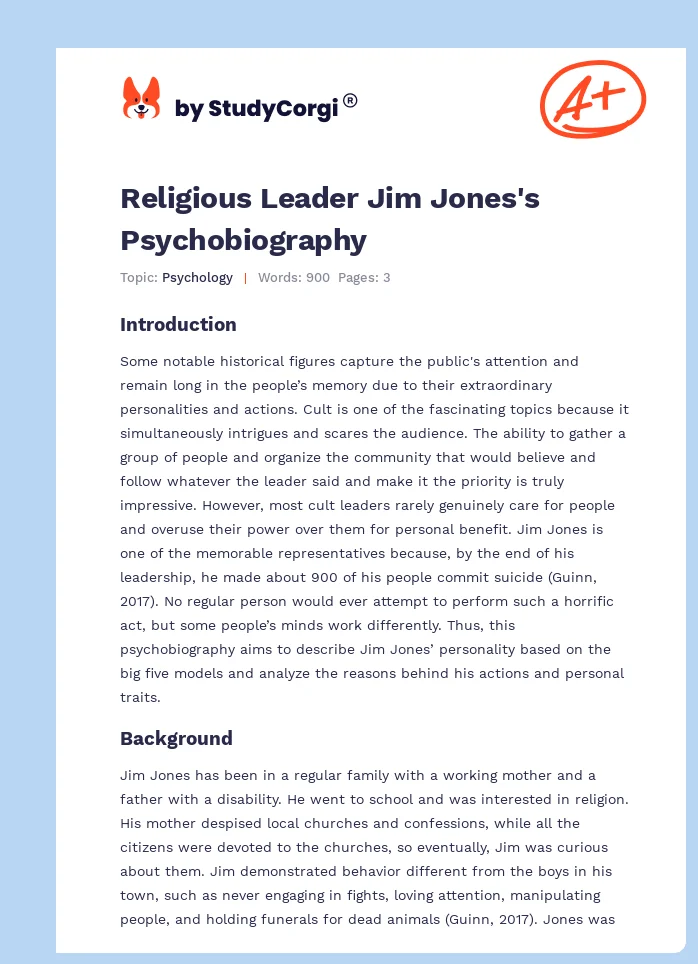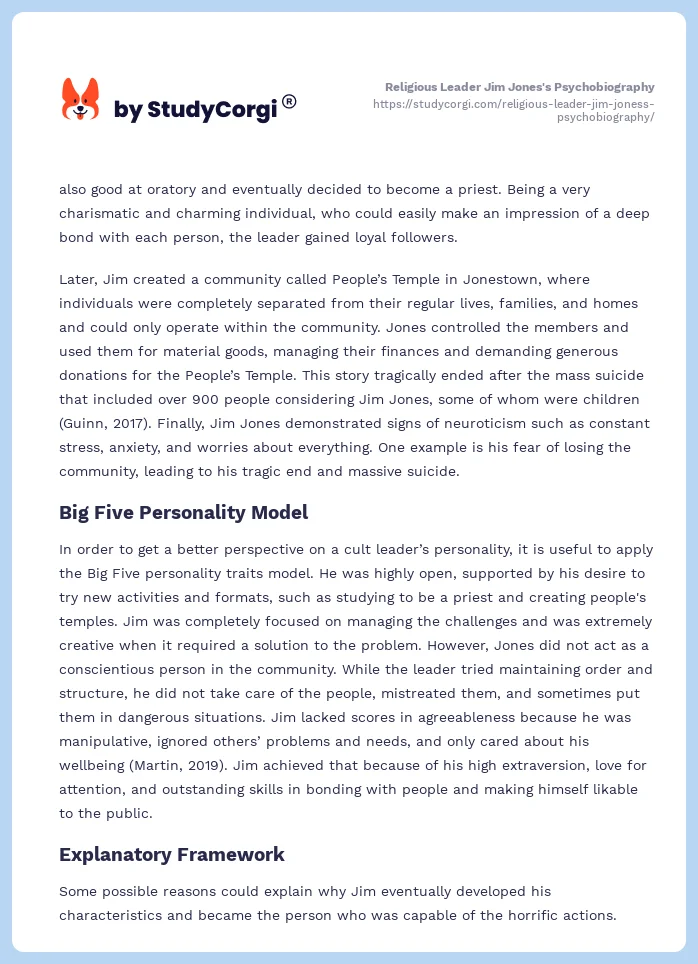Jim Jones remains one of the most controversial religious leaders in American history. His name has become synonymous with the devastating events of Jonestown, where nearly 1,000 lives were lost in a mass tragedy. While his actions are widely condemned, delving into his life, beliefs, and the circumstances leading to the tragedy offers essential insights into this somber chapter of history.
As a religious figure, Jim Jones rose to prominence in the mid-20th century through his charismatic presence and commitment to progressive social causes. However, his story took a dark turn as his Peoples Temple movement unraveled into one of the most shocking tragedies the world has ever witnessed. This article explores the life of Jim Jones, analyzing his rise to power, his teachings, and the eventual collapse of his organization.
By examining the intricacies of Jim Jones' leadership, this article seeks to illuminate the factors that contributed to the catastrophic events at Jonestown. Additionally, it addresses the broader implications of his legacy and the critical lessons that can be drawn from this harrowing period in history.
Read also:Abruzzi Prison Break
Biography of Jim Jones: A Life Influenced by Ideals and Controversy
Early Life and Formative Years
James Warren Jones was born on May 13, 1931, in Crete, Indiana, into a working-class family. His childhood was marked by a profound interest in religion and social justice. Growing up in a racially segregated society, Jones cultivated a deep empathy for marginalized communities, a sentiment that would significantly shape his religious teachings later in life. His parents, Lynetta Putnam and James Jones Sr., instilled in him a sense of responsibility and a passion for making a difference in the world.
Below is an overview of Jim Jones' personal details:
| Full Name | James Warren Jones |
|---|---|
| Date of Birth | May 13, 1931 |
| Place of Birth | Crete, Indiana, USA |
| Date of Death | November 18, 1978 |
| Place of Death | Jonestown, Guyana |
| Spouse | Marshall K. Jones |
Rise to Prominence in the Religious Sphere
Jim Jones began his career as a preacher in the Methodist Church before founding his own congregation, the Peoples Temple Christian Church. Initially gaining a following in Indiana, the church later moved to California, where it attracted a diverse group of members, including African Americans, women, and economically disadvantaged individuals. Jones positioned himself as a staunch advocate for civil rights and social equality, resonating with those who felt excluded by mainstream society.
Jim Jones' Religious Philosophy: A Fusion of Social Justice and Controversy
Core Beliefs and Teachings
Jim Jones' religious philosophy was a distinctive amalgamation of Christianity, socialism, and progressive ideals. He emphasized the importance of social justice, racial equality, and economic redistribution. Jones frequently referenced biblical passages to support his views on these issues, drawing in followers inspired by his vision of a more equitable world. However, his teachings also incorporated elements of authoritarian control, which later became a source of significant controversy.
Key aspects of Jim Jones' religious philosophy include:
- An unwavering commitment to social justice and equality
- A synthesis of Christian theology and socialist principles
- A focus on community building and collective living
The Expansion of the Peoples Temple: From Indiana to California
Expansion and Influence in California
As the Peoples Temple grew in influence, Jones relocated the congregation to California, where it gained a larger and more diverse following. The church established itself in San Francisco and Los Angeles, earning recognition for its community service initiatives and activism. Nevertheless, allegations of financial mismanagement and authoritarian behavior began to emerge, tarnishing the organization's reputation.
Read also:Telegram Teen Zoo
The Move to Guyana: A New Chapter or a Path to Disaster?
Establishment of Jonestown
In the mid-1970s, Jim Jones led his followers to Guyana, where they established a remote agricultural commune known as Jonestown. This relocation was partly motivated by Jones' desire to evade increasing scrutiny from the media and government authorities. However, life in Jonestown was fraught with hardship and tension as Jones tightened his grip on the community, enforcing strict control over its members.
The Tragic Events of Jonestown: A Day That Shocked the World
The Mass Suicide and Its Aftermath
On November 18, 1978, the world was shaken by the news of a mass suicide at Jonestown, resulting in the loss of nearly 1,000 members of the Peoples Temple. The event was precipitated by a visit from U.S. Congressman Leo Ryan, who had come to investigate allegations of human rights abuses. Following a violent altercation with Ryan's delegation, Jones ordered his followers to ingest a cyanide-laced drink, leading to one of the largest mass fatalities in modern history.
Factors Contributing to the Tragedy
Authoritarian Leadership and Psychological Manipulation
Jim Jones' leadership was characterized by authoritarianism and psychological manipulation. He employed fear, intimidation, and control to maintain his authority over the members of the Peoples Temple. This oppressive environment played a pivotal role in the events leading up to the tragedy at Jonestown.
The Legacy of Jim Jones: Lessons from a Dark Chapter in History
Impact on Religion and Society
The legacy of Jim Jones and the Peoples Temple serves as a stark warning about the dangers of charismatic leadership and the potential for abuse within religious organizations. It underscores the importance of transparency, accountability, and respect for individual rights in any community or organization.
Analysis of Jim Jones' Influence: Scholarly Perspectives and Insights
Academic Research and Expert Opinions
Many scholars and experts have examined the life and legacy of Jim Jones, providing valuable insights into the factors that contributed to the tragedy at Jonestown. Their research highlights the significance of understanding the psychological and social dynamics that can lead to such catastrophic outcomes.
Conclusion: Reflecting on the Life and Legacy of Jim Jones
Jim Jones was a complex and controversial figure whose life and legacy continue to intrigue and disturb those who study his story. From his early years as a progressive preacher to the tragic events of Jonestown, his journey is a poignant reminder of the dangers of unchecked power and the necessity of safeguarding individual freedoms.
We encourage readers to contemplate the lessons learned from this harrowing chapter in history and to engage in discussions about the role of religion and leadership in society. Share your thoughts in the comments below, and be sure to explore other articles on our website for additional insights into historical and cultural topics.
Table of Contents
- Biography of Jim Jones: A Life Shaped by Ideals and Controversy
- Jim Jones' Religious Philosophy: A Blend of Social Justice and Controversy
- The Growth of the Peoples Temple: From Indiana to California
- The Move to Guyana: A New Beginning or a Path to Tragedy?
- The Tragic Events of Jonestown: A Day That Shocked the World
- Factors That Contributed to the Tragedy
- The Legacy of Jim Jones: Lessons Learned from a Dark Chapter in History
- Analysis of Jim Jones' Influence: Scholarly Perspectives and Insights
- Conclusion: Reflecting on the Life and Legacy of Jim Jones


